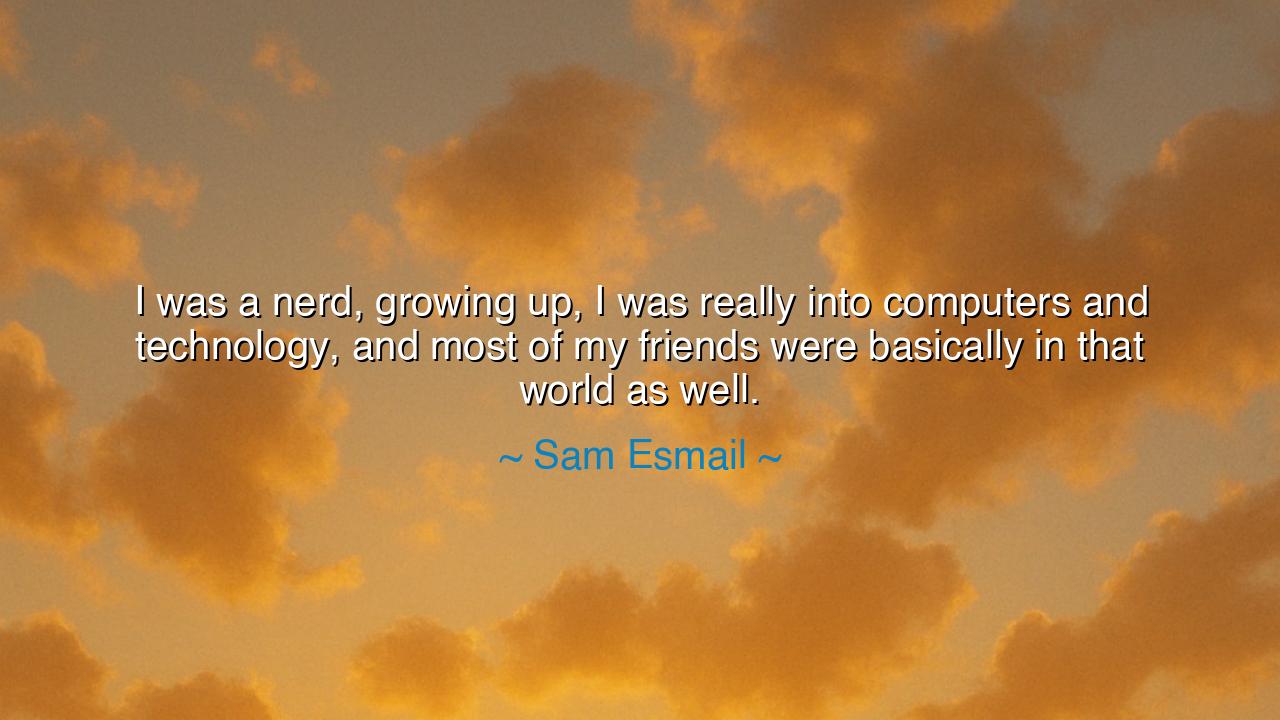
I was a nerd, growing up, I was really into computers and
I was a nerd, growing up, I was really into computers and technology, and most of my friends were basically in that world as well.






“I was a nerd, growing up, I was really into computers and technology, and most of my friends were basically in that world as well.” – Sam Esmail
In these humble and reflective words, Sam Esmail, the visionary creator of Mr. Robot, reveals the quiet roots of genius. His statement speaks not of arrogance, but of origin—of how passion, curiosity, and devotion to the unseen world of technology shaped his path. Beneath the simplicity of his confession lies the timeless truth that every master once began as an outcast, every innovator as one who saw beauty where others saw only oddity. When he says, “I was a nerd,” he reclaims a title once used in mockery and transforms it into a crown of honor, worn by those whose fascination with creation outweighs their fear of being misunderstood.
In the days of youth, when others sought the comfort of belonging, Esmail sought understanding. The glow of the computer screen became his lantern, the hum of circuits his song. Like the scholars of Alexandria who once gathered by lamplight to unravel the mysteries of the cosmos, he and his companions explored the hidden architecture of the digital world. What others dismissed as obsession was, in truth, devotion—the quiet, burning drive of a mind that hungers to build, to solve, to know. And from that devotion grew the mind of an artist-engineer, one who would one day blend human emotion and machine logic into stories that pierced the soul of a generation.
Esmail’s reflection reminds us that the outsider’s path often leads to the summit of creation. Throughout history, the world has been changed by those who were once called strange. The inventor, the poet, the philosopher—each walked alone for a time, guided not by applause but by curiosity. Consider Alan Turing, the mathematician whose fascination with machines and patterns helped end a world war. He, too, lived as one apart, misunderstood by many, yet his mind touched infinity. So it was for Esmail and the countless “nerds” before him—their isolation was not weakness but preparation, shaping them to think freely, to dream boldly, and to build worlds unseen.
In Esmail’s words, there is also a quiet celebration of community. He does not speak of solitude alone, but of friendship—a fellowship of minds united by curiosity. “Most of my friends were basically in that world as well,” he says, and with that, he reminds us that even the most unconventional passions can weave bonds stronger than convention itself. Like the philosophers of Plato’s Academy or the scientists of the Enlightenment, these modern explorers found kinship in shared wonder. Their gatherings around the computer screen were not mere play, but a rehearsal for the collaborative creation that defines all great human progress.
His childhood world of technology was not cold or mechanical; it was alive with imagination. To love computers is not merely to love machinery—it is to love possibility. Within those wires and codes dwell the infinite echoes of human thought. Esmail’s early fascination with this realm was not escapism, but exploration. He saw in technology the same thing the ancients saw in the stars: a reflection of human potential, a mystery that begged to be understood. From that fascination, he forged art that speaks to the eternal struggle between man and machine, freedom and control, isolation and connection.
There is a deeper lesson here for all who walk the uncertain path of individuality: do not hide your passions, no matter how strange they may seem. The world advances through those who dare to love what others overlook. To be a “nerd” is to be devoted—to care deeply, to think differently, to see patterns invisible to others. Let no ridicule or loneliness dim that flame. For every new age needs its thinkers, its tinkerers, its dreamers of code and light. These are the alchemists of the modern world, transforming electricity into imagination, logic into poetry, and solitude into legacy.
So let Esmail’s words stand as a torch for every young seeker who feels apart: your fascination is your gift. The hours you spend absorbed in learning, the worlds you build in silence—these are the foundations of greatness. Surround yourself with those who share your wonder. Build, question, explore. For in the end, it is the “nerds,” the lovers of knowledge, who shape the destiny of mankind. They are the bridge between what is and what could be. And one day, when the world marvels at what you have created, you will look back—as Sam Esmail did—and realize that what once made you different was, in truth, what made you divine.






AAdministratorAdministrator
Welcome, honored guests. Please leave a comment, we will respond soon